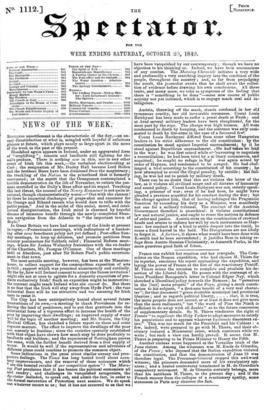NEWS OF THE WEEK.
Beamtss unsettlement is the characteristic of the day,—an un- easy dissatisfaction at what is, mingled with hopeful if solicitous glances at future, which plays nearly as large apart in the news of the week is the past or the present. Bloodshed again appears in Ireland, under an aggravated form of "croplifting ' ; tenants and landlords still fighting for the soil's produce. There is nothing non' in .this, nor in any other event of Irish life this week,—the turbulent electioneering at Cork ; the resignation of Mr. Barley Hall because Lord Roden and the brothers Beers have been dismissed from the magistraey ; the truckling of the Nation to the priesthood that it formerly contemned ; or the reptnitv that the Orangemen contemplated a terrible demonstration on the "5th of November, to satiate the pas- sions mortified in the Dolly's Brae affair and its sequel. Touching this last threat, the counsel of the Newry Examiner is not quite ir- rational, though characteristically warm—" Out with the cannon ! let there be impartial discharges of grape-shot and cannister for the Orange and Riband rascals who would dare to trifle with the public peace." And in the midst of this social, moral, and intel- lectual disorganization, the Irish mind is charmed by hopeful dreams of immense benefit through the newly-completed Shan- non navigation from the Atlantic to "the important town of Boyle."
In Great Britain we have had meetings of the kinds at present in vogue,—Protectionist meetings, with indications of a hanker- ing after some beneficent policy not yet defined ; Post-office Sun- day meetings, to keep up delusion, and promote petitions from country postmasters for Sabbath relief ; Financial Reform meet- ings, where Sir Joshua Walinsley fraternizes with the ex-leader of the Chartists, Mr. Feargus O'Connor. One of these meetings befel at Aberdeen, just after Sir Robert Peel's public entertain- ment in that town.
The most notable meeting, however, ha been at the Mansion- house' to collect support for the cosmopolitan exposition of arts in 1851 ; support which was promised unanimously and cordially. By the by, how will Ireland consent to accept the Saxon invitation? ought she not at once to agitate for a ,domestic exposition of pro.- ducts exclusively Irish? Saic4 an expobition might be instructive: the contrast might teach Ireland what she cannot do. But there is no fear that the Irish will Stay away from Hyde Park : the vast industrial feast will be too attractive and too amusing for Irish taste to resist it.
The City has been- anticipatively busied about several- futufe" transactions of its own,—a meeting to thank Providence for re- lieving the land of pestilence, and to put that gratitude into the substantial form of a vigorous effort to increase the health of the poor by improving their dwellings ; an improved supply of water -will be the topic of another meeting ; and Mr. Simon, the City Medical Officer, has sketched a future report on these and some cognate matters. The effort to improve the dwellings Of the poor Can scarcely be fruitless ; since the societies specially established With that object have shown how much ixitOr be done profitably to landlords and bnilders; and the experienee of Nottinglrui proves the same, with the further benefit derived from a free supply of water. It would be well if the representatives and advocates of different plans could combine to promote the common object. Some indications in the press attest similar uneasy and pros- pective feelings. The Times has long busied itself about sana- tory improvements, and the removal of those nuisances which are the boasted results of our competitive system"! The Mora-' I74 9 Post proclaims that it has beaten the political economists all -and sun ; and challenges its vanquished antagonists, the 'Spectator included, to speak out, and admit the fact, in order to the formal restoration of Protection next session. We do speak Out whatever occurs to us ; but it has not occurred to us that we have been vanquished by our contemporary ; though we have no objection to his thinking so. Indeed, we have been unconscious of any combat. The Morning Chronicle initiates a very wide and professedly a very searching inquiry into the condition of the people, throughout the country ; and, so far from prejudging the result, the journalist avows that he shall await the collec- tion of evidence before drawing his own conclusions. All these traits, and many more, we take as symptoms of the feeling that there is "something to be done "—some new course of public activity not yet initiated, which is to engage much zeal and in-
























